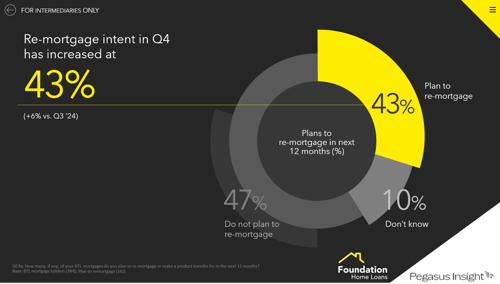Your Business and Industry
Insights for landlords facing refinancing decisions
The Pegasus Insight Landlord Trends research for Q4 2024 highlights a significant pipeline of remortgage business, as many landlords face upcoming refinancing needs.

With many fixed-rate mortgage deals set to expire and potential ‘rate shock’ on the horizon, Q1 and Q2 are expected to be crucial periods for many of the landlord community. The intermediary market will be more critical than ever in guiding landlord clients through remortgage.
According to NRLA Survey Insights in the latest Pegasus Insight Landlord Trends for Q4 2024, 85% of landlords currently hold at least one fixed-rate mortgage, with 35% of these deals expiring before Autumn 2025.
Despite interest rates potentially peaking, many leveraged landlords will likely experience increased mortgage costs when their current deals end. Notably, fewer than 31% believe their next mortgage interest rate will be lower than their existing one, and 18% remain uncertain. Around half expect their new rate to be higher, reinforcing the need for expert mortgage advice.
The research also reveals that 42% of leveraged landlords intend to remortgage or complete a product transfer within the following year. On average, those refinancing will rearrange 2.4 Buy to let loans. Portfolio landlords are cited as the most active, with 56% expecting to refinance at least three mortgages.

Regarding ownership structure, 75% of refinancing will be in a personal name, reflecting current portfolio trends. Only 1% of landlords holding their entire portfolio in a personal name plan to transfer properties into a limited company at the point of refinancing. However, portfolio landlords remain more likely to choose the limited company route than consumer landlords (22% vs. 10%).
Encouragingly, 69% of landlords used a broker for their most recent buy to let borrowing, with portfolio landlords (4+ properties) even more likely to do so (75%). However, a portion of landlords still approach lenders directly, either online (50%) or via phone (35%), indicating further opportunities for brokers to demonstrate the value of professional advice.
This is particularly relevant as more landlords consider limited company structures for future purchases, reinforcing the need for brokers to remain the go-to resource in an increasingly complex lending environment.
For intermediaries only



